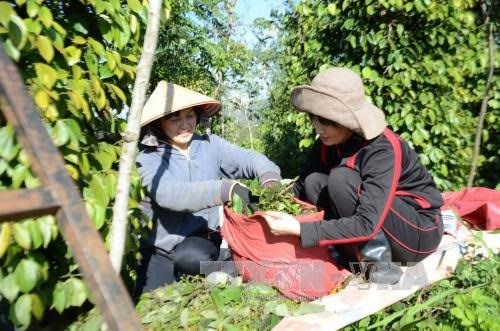
When international market pressures challenged Vietnamese farmers to adopt good agricultural practices and produce organic pepper, many responded positively.
Explaining the current situation, Nguyen Dang Nghia, director of the southern centre for soil, fertilizer and environment research, said: “Pepper that uses exceeding amounts of crop protection agents will be returned (by buyers).
 |
| Farmers at the Thu Thuy pepper farm in the Central Highlands province of Dak Nong collect pepper. (Source: VNA) |
“To maintain our share of 50 percent in the world market, we have to produce organic pepper. Farmers need to reduce all types of chemicals used to increase pepper vines’ resistance and prevent pests.”
Dang Tan Huynh of Nhan Co commune, Dak R’Lap district in Dak Nong province, has practised organic farming for more than ten years. He has also joined another USDA-standard organic pepper chain owned by a FDI company.
In September, 2016, Huynh and ten other members established the Dong Thuan Organic Pepper Co-operative. They pooled 50ha of land to form a raw material area in Nhan Co commune, the second biggest pepper cultivation area in Dak Nong province.
At the Dong Thuan Cooperative, pepper is planted and harvested using biological methods without any chemical fertilizer or GMO substances. Besides, farmers follow strictly the direction of the management committee, the guidance of the technical department and the monitoring of the control board.
Also practising clean farming methods since its establishment in 2014 is the Lam San Agricultural Co-operative in Cam My district, Dong Nai province.
Producing “clean” pepper on a 1,100ha area, this co-operative is one of few Vietnamese organisations exporting pepper to the EU market.
“Because of special characteristics of the spice industry, prices can only rise when farmers produce pepper meeting VietGAP standards”, said Nguyen Ngoc Luan, Director of the Lam San Agricultural Cooperative.
Luan, who has experience working in Germany, said he realised that the EU is a difficult market with a high demand for pepper. Therefore, he decided to collaborate with more than 1000 families to form an enterprise producing organic pepper.
Luan said producing clean pepper was simple since the procedures and farming methods have been researched and introduced in a clear way. Being part of the Lam San Co-operative has helped farmers maintain their market share and earn stable profits against the background of falling pepper prices. The co-operative plans to export pepper to Japan in the near future.
Market demand is prompting more and more pepper farmers to apply good agricultural practices, local reports said.
The Vietnam Pepper Association (VPA) has said that in 2017, pepper exports will face many difficulties and challenges, with main markets like the USA and EU tightening their quality controls.
Nguyen Mai Oanh, Vice Chairwoman and General Secretary of the VPA, said that several farmers had researched and consulted experts on their own to learn about proper pepper cultivation. They also formed groups to share experiences in practising organic farming, she said.
Besides, they were approaching enterprises and introducing their high-quality pepper. "This is a positive sign for Vietnam’s pepper industry," Oanh said.
Farmer Nong Van Le of Thuan Ha commune, Dak Song district, Dak Nong province said his family planted more pepper this year. "The output is 20 tonnes, double that of last year. Besides the favourable weather conditions, we use biological substances to improve soil quality, prevent fungal growth and save 50 percent of NPK (fertiliser).
“Some trading enterprises have approached our family and offered 10 percent higher prices than offered to other families”, he said.
A report on the VPA website quotes Yap Chin Ann of the Malaysia Pepper Association as saying that the attitude of farmers is key to sustainable agricultural practices.
Farmers should be advised to use organic fertilizers and modern processing technologies to increase the quantity and quality of their produce and products, he said.
The Ministry of Agriculture and Rural Development has asked VPA and related agencies to connect processing enterprises and farmers to accelerate sustainable production of organic pepper.
At the same time, VPA members are planning to establish an agency to issue quality certification and stamps of origin for organic pepper. They say it will help Viet Nam’s pepper exports gain higher value and assist international markets to control pepper quality.





![[Photo series] Long Khanh Ring Road 1 ramps up construction for technical traffic opening on Feb. 3](/file/e7837c02876411cd0187645a2551379f/012026/anh_2_resized_20260119144842_20260119151818.jpg?width=500&height=-&type=resize)